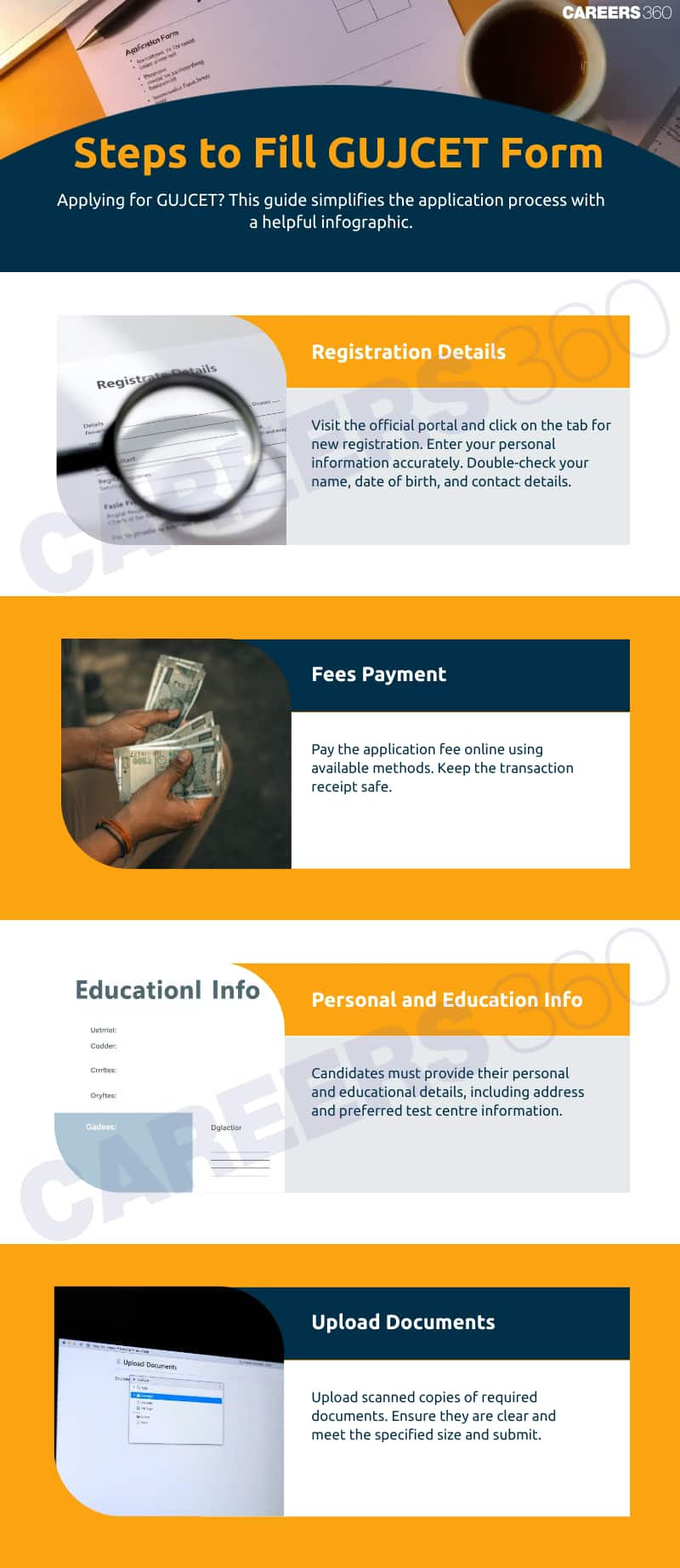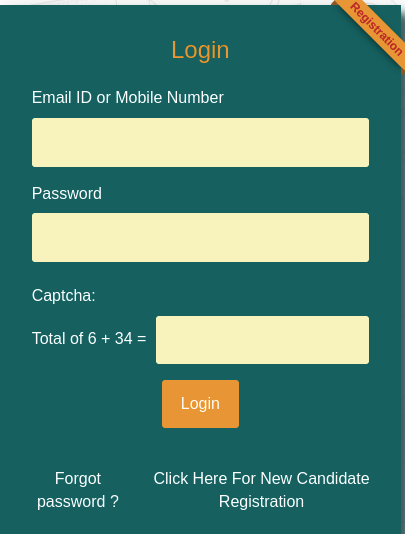GUJCET Registration 2026: Last Date, Late Fee, Apply Online at gujcet.gseb.org
GUJCET Registration 2026 – GSHSEB has closed the GUJCET 2026 application process. The authority has provided the GUJCET 2026 registration link on the official website, gujcet.gseb.org. Candidates had to ensure they fulfilled the GUJCET eligibility criteria while applying. The registration process included filling out the application form, uploading required documents, and paying the application fee. Students must also review the documents required for GUJCET 2026 before submitting the form. The deadline for GUJCET 2026 registration without a late fee was January 6, 2026. The authority will conduct the GUJCET 2026 entrance exam on March 29, 2026. Candidates can find the direct link for the GUJCET 2026 application below.
This Story also Contains
- GUJCET Registration 2026 Important Date
- Who can apply for GUJCET 2026? - Eligibility Criteria
- Documents Required to Fill GUJCET Application Form 2026
- How to fill out GUJCET Application Form 2026?
- GUJCET Previous Year Statistics
.jpg)
The GUJCET 2026 login was created after the basic registration is completed. After this, the candidate's login credentials, application number and password were created. For the GUJCET application to be successfully submitted, candidates had to pay an application fee of Rs 350. Only registered candidates are eligible to appear for the GUJCET 2026 exam. Read the complete article for more information on the application form for GUJCET 2026.
GUJCET 2026 Registration Details
| Particulars | Details |
|---|---|
| Full Exam Name | Gujarat Common Entrance Test |
| Conducting Body | Gujarat Secondary and Higher Secondary Education Board |
| GUJCET 2026 exam Registration date | |
| Last date to register for GUJCET with a late fee of Rs. 1000 | January 16, 2026 |
| Frequency Of Conduct | Once a year |
| Exam Level | State Level Exam |
| Mode Of Application | Online |
| Application Fee | 350 |
| GUJCET registration 2026 official website | gujcet.gseb.org. |
GUJCET Registration 2026 Important Date
Gujarat Secondary and Higher Secondary Board has announced the GUJCET 2026 application form dates on the official website. The important dates related to GUJCET exam registration are mentioned in the table below.
GUJCET 2026 Registration Dates
| Event | Dates |
|---|---|
GUJCET registration 2026 date | December 16, 2025 |
GUJCET registration 2026 last date |
January 6, 2026 |
GUJCET 2026 registration last date with late fee | January 16, 2026 |
GUJCET 2026 exam date | March 29, 2026 |
Who can apply for GUJCET 2026? - Eligibility Criteria
- Candidates must be Indian citizens
- Candidates must have passed 10+2 or its equivalent with Physics and Mathematics as compulsory subjects.
- Candidates must have secured at least 45% marks in the qualifying subjects (40% for reserved categories)
Documents Required to Fill GUJCET Application Form 2026
Candidates have to upload scanned documents for the GUJCET 2026 registration process. Below is the list of documents required for GUJCET 2026 registration.
Documents related to academic qualifications
Email ID and mobile number
Family income details
Aadhaar card number
Scanned images of photograph and signature
Specifications for uploading Photograph and Signature in GUJCET 2026 application form
| Document | Size | Format | Dimension |
|---|---|---|---|
Photograph | 5 KB to 50 KB | JPG | 120 X 120 pixels |
Signature | 5 KB to 50 KB | JPG | 120 X 120 pixels |
How to fill out GUJCET Application Form 2026?
The authority concluded the registration for Gujarat CET 2026 with a late fee on January 16, 2026. Eligible candidates were able to complete the GUJCET 2026 registration online. Candidates had to complete the fee payment in online mode. In case candidates wanted to fill out the application after the last date, a late fee of Rs 1000 was applied, and this window was available only for a short time. Candidates had to follow the steps mentioned below for the Gujarat Common Entrance exam registration 2026.

Steps to fill GUJCET Application Form 2026
Step 1: Registration - The first step is to complete the GUJCET form registration using the details mentioned below.
Email Id
Mobile Number
Create Password
Captcha code
After filling all the details in the registration form, candidates have to click on the login tab. The login details will be sent to the registered email ID.
GUJCET Login 2026

Step 2: Payment of fee - Log in using credentials and pay the GUJCET registration 2026 fees online mode using their Mobile number/Email, password, and captcha code. Applicants can pay the GUJCET 2026 application fee through both online and offline modes. The accepted online modes of payment are through Debit /Credit Card/Internet banking, while candidates can pay offline using SBI Branch Payment, and Online and Push Response (SBI cash offline payment). After successful payment, candidates must take a printout of the receipt.
GUJCET Registration Fees 2026
| Particulars | Details |
|---|---|
GUJCET 2026 registration fees | Rs 350 |
Late Application Fee | Rs 1000 (penalty amount) Total late fee amount- Rs 1350 (Rs 1000 + 350) |
Step 3: Filling up Application Form details - After successful payment, candidates can proceed to fill out the application form. The details candidates need to fill in the application are mentioned below.
Personal Details
Name of the candidate
Date of Birth
Gender
Caste
Physically Handicapped Category
Family Annual Income Details
Aadhaar Card Number
Communication Address
State, District, Taluka, City/Village, Pin code
Email ID, Mobile Number
Examination Details
Board Code
Group & Medium
Board & School Details
HSC School Index Number
School Code
Name of School
Center Code & Name of Center
Step 4: Uploading Documents - In the next step, candidates have to upload the scanned images of their photograph and signature as per the specifications in the application form.
Step 5: Print out GUJCET 2026 Application Form - The last step is to preview all the details and submit the application form. Once the GUJCET application form 2026 is successfully submitted, candidates must download or take a printout of the completed form for future use.
GUJCET Previous Year Statistics
The exam authority will release the GUJCET statistics along with the declaration of the result. Candidates can check the below table for GUJCET previous year exam statistics to know the number of applicants and examinees of Gujarat CET.
GUJCET Previous Year Statistics
| Session | Candidates Registered | Candidates Appeared |
|---|---|---|
| Physics/Chemistry | 107694 | 102913 |
| Biology | 67934 | 64965 |
| Mathematics | 40073 | 38452 |
Contact Details/Helpdesk:
Candidates can use the below contact details in case of any issues with the GUJCET 2026 application process. -
Gujarat Secondary and Higher Secondary Education Board,
Sector 10, Near Old Sachivalaya,
Gandhinagar - 382043
Email: gshseb_gnr@yahoo.in
Phone: (079) 23220538
Frequently Asked Questions (FAQs)
The GUJCET 2026 registration began on December 16, 2025.
The last date to apply for GUJCET 2026 with a late fee was January 6, 2026.
GUJCET application form 2026 official website is gujcet.gseb.org.
The GSEB GUJCET 2026 registration fee was Rs 350. However for those who were applying along with a late fee had to pay Rs 1350 (1000+350).
The GUJCET 2026 login credentials include registration number and password.
Gujarat Common Entrance Test (GUJCET) 2026 exam is conducted for admissions to professional degree courses like Bachelor of Engineering and Technology and Bachelor of Pharmacy offered by the participating institutes. Gujarat Secondary and Higher Secondary Education Board (GSEB) conducts the GUJCET exam once a year.
Candidates were able to fill out the GUJCET application form in a few simple steps, including registration, form filling, uploading of documents, and payment of the GSEB GUJCET registration fee.
Candidates were able to register for GUJCET 2026 application form on the official website.
Yes, GUJCET is mandatory, especially for applicants seeking admission to Pharmacy courses.
Yes, the GUJCET 2026 exam will be held on March 29, 2026.
Popular Courses and Specializations
List of colleges accepting GUJCET
Browse Engineering Colleges by State
Questions related to GUJCET
On Question asked by student community
Last year, the closing rank in round 1 counselling was 307 for general and 394 in round 2 and 399 in round 3. Based on that, with a 300 GUJCET rank and 88th percentile in PCM (GSEB), you may have a good chance of securing admission to Nirma University for
Hello Student,
You can find the Gujcet paper 2025 pdf and the answer key in the link provided below -
Link - GUJCET 2025 Question Papers with Solutions – Download Free PDF
Hope this helps!
Yes, you can take admission in the PDPU and Nirma University using your score as per the GUJCET result and class 12th marks. Check the GUJCET cutoff here.
Yes, PDEU BTech admissions are granted on the basis of JEE Main scores, followed by shortlisting of merit-based and counselling. For MBA, institute accepts CAT/ XAT/ NMAT scores.
For GUJCET examination, students are usually allowed to use a simple normal calculator. The calculator should only have basic functions like addition subtraction multiplication and division. Scientific calculators programmable calculators or calculators with advanced features are not permitted inside the exam hall.
For GSEB Class 12 Science PCM board examinations,
